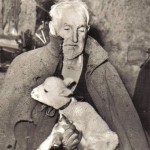 1 Peter 2:18-25
1 Peter 2:18-25
One year when I was teaching freshman English at All Saints Episcopal school in Tyler, Texas, and we began the year by coordinating some of the literature with ancient history, I taught my students about Greek philosophy and religion so that they might understand Greek literature. I had them compare and contrast Christianity and the Greek religion, and in my meditation on this comparison, a humorous idea took hold of me (many do, when I’m teaching and interacting with young people).
I asked my class if they thought anyone in Athens c. 400 B.C. went around wearing armbands and bracelets that said “WWZD,” that is: “What would Zeus do?” My point was that no one in his right mind would want to pattern his life after the Greek God Zeus, for Zeus was a hot-headed, skirt-chasing, fickle god who did not make for a good role model.
But this morning we are commanded by St. Peter to follow in the footsteps of Jesus Christ, who left an example for us. We are left to think this morning, not so much WWJD – “What would Jesus do?”, as if we can figure out how He might tackle 21st century culture, but WDJD – “What did Jesus do?” and WSID – “What should I do?”
Today, we are to consider the terrible and awesome facts of what Jesus did and the heavy and heavenly call we have to follow our Good Shepherd in all His ways.
We are first to follow Jesus in His righteousness. The righteousness of Jesus is not a relative righteousness but an absolute one. In Him there was no sin and no guile, and even when terribly persecuted and wronged, He did not revile. On the positive side of righteousness, He loved, that is, He thought more highly of others than Himself. Only a love so defined could compel a man, especially a God-man, to the Cross.
And so today, when we re-imagine and re-create the death of Christ Jesus and attempt to apply that death to our lives, we find that Jesus leads us into righteousness. All that we meditate on today and in our lives about His death was for our righteousness. As St. Peter says in verse 24: He suffered and died for you, that you might live for righteousness, for God, and not for yourself. In this way, His righteousness is to become our righteousness and His love is to become our love.
Our covenant with God is like the Marriage Covenant: Christ is the Bridegroom, and we, the Church, are the Bride. “I take thee, Jesus, to my wedded Husband, to have and to hold from this day forward, for better or worse, for richer for poorer, in sickness and in health, to love and to cherish, and to obey, till death us do part; and thereto I give thee my troth. With this ring, I thee wed, with my Body I thee worship, and with all my worldly Goods I thee endow: In the Name of the Father, and of the Son, and of the Holy Ghost. Amen.”
This following Jesus in His righteousness doesn’t sound like such a bad deal at first. But then the realization dawns on us that to follow Him in His righteousness, we must follow Him to the Cross. For the way to righteousness and holiness is to deny yourself, take up your cross, and crucify your Old Man.
Peter has to go and spoil the party by saying this: that you were called for suffering as Christ did. You were called to suffer for Christ and to bear it as Christ did. Therefore, following Christ in His righteousness means following Him in His Cross, by picking up our Cross daily, for even the Son learned obedience through what He suffered (Hebrews 5:8).
Jesus Christ suffered for you; and now He asks you, in this life that He has given you, to follow Him in that suffering. You don’t need to look for it – it will come. It may not be the kind of persecution that the early Christians faced, but you will suffer, and when you do, it is intended to lead you to Christ.
The question is: How will you respond? You have a supermarket of possible responses. You could: complain; blame God; doubt; try to find relief in the lusts of the flesh; stoically try to ignore it; blame others; pickle yourself in your favorite substance; etc. OR . . . you could set your face like flint toward Jerusalem and follow Jesus Christ in His suffering. You could follow Jesus and seek to be with Him “who, when He was reviled, did not revile in return; when He suffered, He did not threaten, but committed Himself to Him who judges righteously” (verses 22-23).
As in marriage, when a man and woman vow to live in love with their spouse – for richer, for poorer; in sickness or health; for better or worse – so you vowed the same thing to God (check your baptismal vows and read the Bible if you’re not sure about this!)
He was abandoned in His suffering by His disciples, but now His disciples do not dare abandon Him in their own suffering. Jesus leads us in our suffering, as our Shepherd. He has been there before: He has suffered – and done it without sin. Christ’s shepherd crook . . . the means by which he disciplines, guides, and protects you . . . is a Cross.
But we follow Jesus not only for poorer, not only for sicker, or for worse. We follow, knowing that He knows the way to better things. He knows the Father, for He and the Father are one. He knows the way to heaven – because He is the Way, and He is Heaven itself. We must follow Jesus in depending on God for all things, suffering and otherwise, and so commit ourselves to Him who judges righteously.
Keep your eyes on Jesus – follow His footsteps – because He will lead you to the Father. When good things happen, you should be led to God, who is the giver of every good gift. Acknowledge God: don’t take credit for what He has done. Really, if you think about it, isn’t it ridiculous for a man to say: “Look at how great I am because I’m so intelligent?” But who created your brain, and who gave your parents genes for intelligence? Or “Look at how great I am because I’m so successful in life?” You fool! Who planned for you to be born in the U.S., the richest nation ever, where there are more opportunities for success than anywhere else? And who gave you the mind, the ideas, the desire, the hands, the colleagues and family and friends to enable you to be a success?
When you suffer, you should be led to God just as much, if not more, than when things are good. Every cause of suffering in this life – from the least to the greatest – is God calling to you to depend upon Him. Depend on Him, commit yourself to Him, even as Jesus did. When you pick up our cross daily, when you suffer for Jesus Christ, it doesn’t end there: you are to give your cross up to God.
All things, then, should lead you to God.
Follow the steps of Jesus Christ, for He is your Good Shepherd. He has been through everything you will go through – and more – and yet without sin. Follow His steps, because He came to give you an example of how to live in love of God and obedience to Him. Follow Him in all things, for richer or poorer, in sickness and health, for better worse.
For if you follow Jesus Christ, the Shepherd of your soul, though He leads you first to the Cross, then He will lead you home – home to the Father, home to heaven, and home with Himself forever.
Prayer: Almighty God, whose most dear Son went not up to joy but first he suffered pain, and entered not into glory before he was crucified: Mercifully grant that we, walking in the way of the cross, may find it none other than the way of life and peace; through Jesus Christ your Son our Lord. Amen.
Point for Meditation:
1. Consider the suffering in your life. In what ways do you suffer? How have you sought to deal with this suffering?
2. How did Jesus deal with the suffering He underwent? How can He apply that same attitude to you in your life?
3. How might God desire to use the suffering in your life as a means of bringing you closer to Him?
Resolution: I resolve to consciously see all of my suffering today as the Cross of Jesus and a means of uniting me to Him.
© 2012 Fr. Charles Erlandson
Zeus – Wikipedia entry on Jupiter













